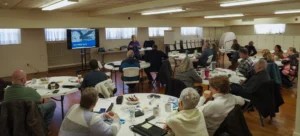“Why not Europe?” I said. “Other kids go to Europe.”
“I don’t want to be like other kids,” she said.
I prayed about it,” she said, “and I think this is something I’m supposed to do.”
“Anyway, I probably won’t be picked,” she concluded.
I prayed about it too, as did her father. She was picked. She went to India for about five months, stayed in rooms where the roosters awakened them early every morning, and ate cereal crawling with ants. She studied in university classrooms where monkeys came in through open windows and stole their lunches, got her nose pierced, contracted a nasty intestinal bug, and had to visit a hospital with less than ideal standards to get an IV.
“I would have told you,” she said, “but I didn’t want you to worry.” Right . . .
I endured criticism from a number of other parents: “How could you let her go? India is a dangerous place. Aren’t you afraid she’ll catch something?”
I spent my first Christmas without her. I cringed when she told me she had gotten her nose pierced. Nevertheless, she came back home to us safe and sound, looking thin, but better for the experience.
Today she is the mother of four daughters—all with a flair for independent thinking. I imagine that one day soon one or more of them will want to do something she considers risky or unnecessary. I’m betting they will push the boundaries of her comfort zone and have her wondering how much rope to give them and how soon to give it.
It’s hard being a father or mother, especially as our children grow and become more independent in their thoughts and activities. What kinds of music are they listening to? What kinds of books are they reading? How much screen time do they have and what are they seeing on those screens anyway? Who or what is influencing my child the most?
What are parents to do when someone or something besides themselves starts gaining traction with their child? What is the best way to raise a thoughtful, self-confident, compassionate young leader in troubling times such as these?
In her book, Give Them Wings, Carol Kuykendall offers some pointers for parents:
- Embrace change. As kids grow and mature, parents need to give them more freedom and the opportunity to try some new things. Allow kids the opportunity to make more decisions and experience the consequences of those decisions with each advancing year.

- Abandon the need to always be right. Especially when it comes to preteens and teens, allow them the freedom to have a different opinion. Accepting differences allows you to grow closer to your child.
- Practice patience. Remember that it takes many pieces of a puzzle to make a whole. In the same way, it takes many moments, days and experiences to form your child. Give it time and resolve not to rush the process.
- Avoid writing your resume based on your child’s accomplishments. If we see our child as evidence of our good parenting or influence, we can put unnatural pressure on them to become what we want them to be, as opposed to who they were intended to be. You may be very proud of your child, but avoid the temptation to take your value and worth from your child’s accomplishments. Doing so may discourage his or her natural gifts and abilities.
- Don’t let your fear control their choices. It’s so easy to do and defend. We don’t want to allow them to do new things because we worry about them. Will they be safe? Will they make good choices? What bad things could happen? Growing great leaders requires giving our young people the opportunity to experience many different facets of life with love and support from people who love them, while also avoiding the tendency to hover, protect and rescue. We often learn best from our mistakes, especially when we have supportive people to guide us along the way.

With each passing year, I see my daughter’s children growing, maturing, and advancing in life making more and more choices of their own. I know they are loved. I know they’re surrounded by supportive adults. I hope that a few years from now their parents also will have the courage to let them go when they want to spread their wings and fly. And then again, given their children’s DNA, they might not have a choice.




